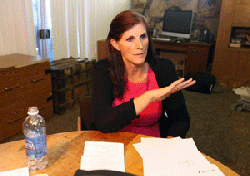LOS ANGELES – An anti-Islam film trailer that has spawned violent protests across the Muslim world can remain on YouTube despite a request from a California actress to have it taken down, a judge ruled on Thursday.

|
| Actress Cindy Lee Garcia talks about the script that she read and performed in contrast to the video published on YouTube in her home this week. PHOTO: Michael Fagans/The Californian |
Actress Cindy Lee Garcia had sought to have the film removed in a suit filed on Wednesday against YouTube parent company Google Inc and a California man linked to the film. She argued that she was duped into taking part and had since received death threats.
“The request for a temporary restraining order is denied. The plaintiff has not shown a likelihood to prevail on the merits,” Los Angeles Superior Court Judge Luis Lavin said. A date for a future hearing in the case was not immediately set.
Garcia’s is the first known civil lawsuit connected to the making of the video that depicts the Prophet Mohammad as a womanizer and a fool. The film helped generate a torrent of violence across the Muslim world last week during the anniversary of the September 11, 2001, attacks on the United States and in the following days.
The violence included an attack on U.S. diplomatic facilities in Benghazi in which the U.S. ambassador to Libya and three other Americans were killed. U.S. and other foreign embassies were also stormed in cities in Asia, Africa and the Middle East by furious Muslims.
In her lawsuit, Garcia accused a producer of the movie, whom she identified as Nakoula Basseley Nakoula using the alias Sam Bacile, of duping her into appearing in a “hateful” film that she had been led to believe was a simple desert adventure movie.
“There was no mention of ‘Mohammad’ during filming or on set. There were no
references made to religion nor was there any sexual content of which Ms. Garcia was aware,” read the lawsuit, which accused Nakoula of fraud and slander.
For many Muslims, any depiction of the prophet is blasphemous. Caricatures deemed insulting in the past have provoked protests and drawn condemnation from officials, preachers, ordinary Muslims and many Christians.
Last week, Google rejected a request by the White House to reconsider its decision to keep the clips on YouTube, but the company has blocked the trailer in certain Muslim countries such as Egypt and Libya. The White House had asked Google to evaluate whether the video violated YouTube’s terms of service.
Privacy Issues
On Thursday, Garcia sat in court wearing a red blouse and black skirt. At one point she raised her hand to speak when the judge pointed out the actress has appeared in the media since the film, despite making a claim to invasion of privacy. Garcia was not allowed to address the court.
Her attorney, Cris Armenta, sought to persuade the judge that Garcia, who is from Bakersfield, California, suffered harm similar to a person whose privacy is violated in the unauthorized release of a sex tape.
“This has to do with somebody who did not consent to a certain product, and yet it was put out there,” Armenta said.
An attorney for Google said the rights of an actor do not protect that person from how a film is perceived.
“If we viewed it that way we’d say that Arnold Schwarzenegger as a cyborg in ‘Terminator’ was a factual statement about Arnold Schwarzenegger,” lawyer Timothy Alger said, adding that YouTube is only a host for the film clips that it had no hand in producing or posting to the site.
U.S. officials have said authorities are not investigating the film project itself and that even if it was inflammatory or led to violence, simply producing it cannot be considered a crime in the United States due to the nation’s strong free speech laws.
But Nakoula, a Coptic Christian California man who pleaded guilty to bank fraud in 2010, was interviewed by federal probation officers on Saturday probing whether he violated the terms of his release while making the film.
Nakoula, who was released from prison in 2011, is prohibited from accessing the Web or assuming aliases without the approval of his probation officer, court records show. Violations could result in him being sent back to prison.
Nakoula, 55, did not return to his house in the Los Angeles suburb of Cerritos following his interview, and his whereabouts are unknown. Last week, he denied involvement in the film in a phone call to his Coptic bishop in Los Angeles.
Garcia, asked if a longer version of the film exists, told reporters outside court before the hearing that she did not believe the movie was ever finished.
“There is no entire movie, there’s only that clip,” she said.






Leave a Reply